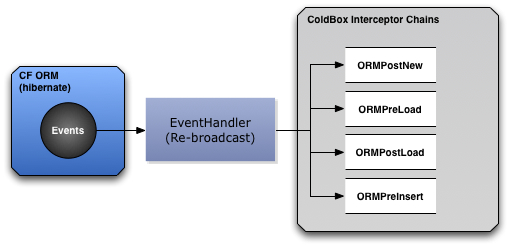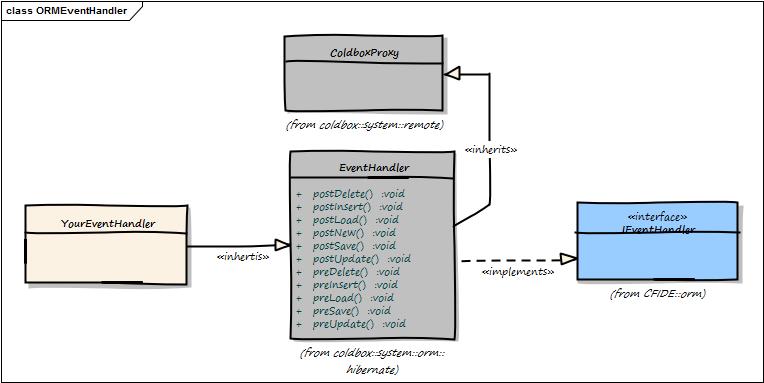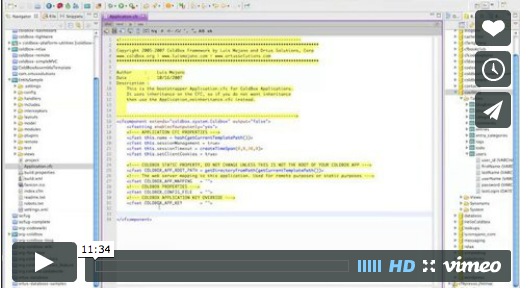
In this basic ORM configuration structure I have two lines that deal with ORM events:
This enables the internal Hibernate interceptors and then you map a global CFC that will handle them. Mine will be in my local application's model folder named ORMEventHandler. It has to be inside of my application's folder structure in order to be able to talk to the ColdBox application. This is extremely important, as this creates the bridge between the ORM and ColdBox.
Imporant The ORM Event Handler CFC MUST exist within the application in order for the bridge to work.
By enabling the global event handler, WireBox can also be enabled to listen to these events and use them to wire up dependencies in these ORM entities and thus provide dependency injection for ORM entities. The injection takes place during the postLoad() and postNew() event cycles. All you need to do is enable ORM injection via the ConfigurationCFC
Important If you have to also override the event handler's postLoad(),postNew() method, you will then need to call the super class method so the injection procedures can take place: super.postLoad(entity) super.postNew(entity)
The video below describes the entire process:
By using the ColdBox ORM event handler as your base class for your application's event handler you will inherently get the ability to talk to your ColdBox application instance and even inject objects into your ColdFusion ORM entities using . Not only that but we have also enabled the event handler to re-transmit the Hibernate Interceptions and announce them as ColdBox Interceptions. This way, you can intercept very easily the ColdBox way, create several chains, etc. The first thing you need to do is tell the CF Engine that you want to enable event handling and also which CFC will handle your global ORM entity events.
Important: You can also use the approach which allows your event handler to be portable between ColdBox and Non-ColdBox applications and also allows you to NOT even create an event handler but just point it to the appropriate class.
We have also expanded the hibernate ORM events to bridge the gap to the ColdBox interceptors. So now all the hibernate interceptors will relay their events to ColdBox via interceptors. This means that each hibernate event, like preLoad() for example, will announce its ColdBox counterpart: ORMPreLoad(). Below are the new interception points the ORM Event Handler exposes with the appropriate interception data it announces:
With the exposure of these interception points to your ColdBox application, you can easily create decoupled executable chains of events that respond to ORM events. This really expands the ORM interceptor capabilities to a more decoupled way of listening to ORM events. You can even create different interceptors for different ORM entity classes that respond to the same events, extend the entities with AOP, change entities at runtime, and more; how cool is that.
The ColdFusion documentation says that in order to create a global event handler that it must implement the CFIDE.orm.IEventHandler interface. So all you need to do is create the CFC and make it extend the core class that will provide you with all these capabilities: cborm.models.EventHandler
That's it! Just by doing this the CF ORM will call your CFC's event methods in this CFC and satisfy the interface. Of course you can override the methods, but always remember to fire off the parent class methods in order for the ColdBox interceptions to still work. You can then override each event method as needed. Below is a chart of methods you can override:
The base event handler CFC you inherit from has all the ColdBox interaction capabilities you will ever need. You can find out all its methods by referring to the API and looking at that class or by inspecting the ColdBox Proxy class, which is what is used for enabling ColdBox interactions: coldbox.system.remote.ColdboxProxy
Method | Description |
postNew(entity) | This method is called by the ColdBox Base ORM Service Layers after a new entity has been created via its new() method. |
preLoad(entity) | This method is called before the load operation or before the data is loaded from the database. |
postLoad(entity) | This method is called after the load operation is complete. |
preInsert(entity) | This method is called just before the object is inserted. |
postInsert(entity) | This method is called after the insert operation is complete. |
preUpdate(Struct oldData,entity) | This method is called just before the object is updated. A struct of old data is passed to this method to know the original state of the entity being updated. |
postUpdate(entity) | This method is called after the update operation is complete. |
preDelete(entity) | This method is called before the object is deleted. |
postDelete(entity) | This method is called after the delete operation is complete. |
Interception Point | Intercept Structure | Description |
ORMPostNew | {entity} | Called via the postNew() event |
ORMPreLoad | {entity} | Called via the preLoad() event |
ORMPostLoad | {entity} | Called via the postLoad() event |
ORMPostDelete | {entity} | Called via the postDelete() event |
ORMPreDelete | {entity} | Called via the preDelete() event |
ORMPreUpdate | {entity,oldData} | Called via the preUpdate() event |
ORMPostUpdate | {entity} | Called via the postUpdate() event |
ORMPreInsert | {entity} | Called via the preInsert() event |
ORMPostInsert | {entity} | Called via the postInsert() event |


